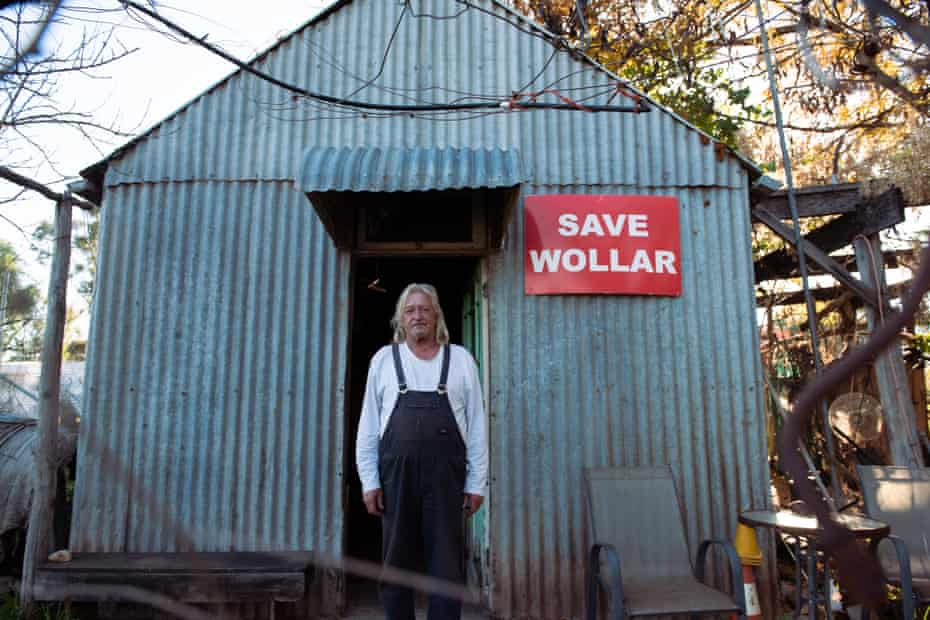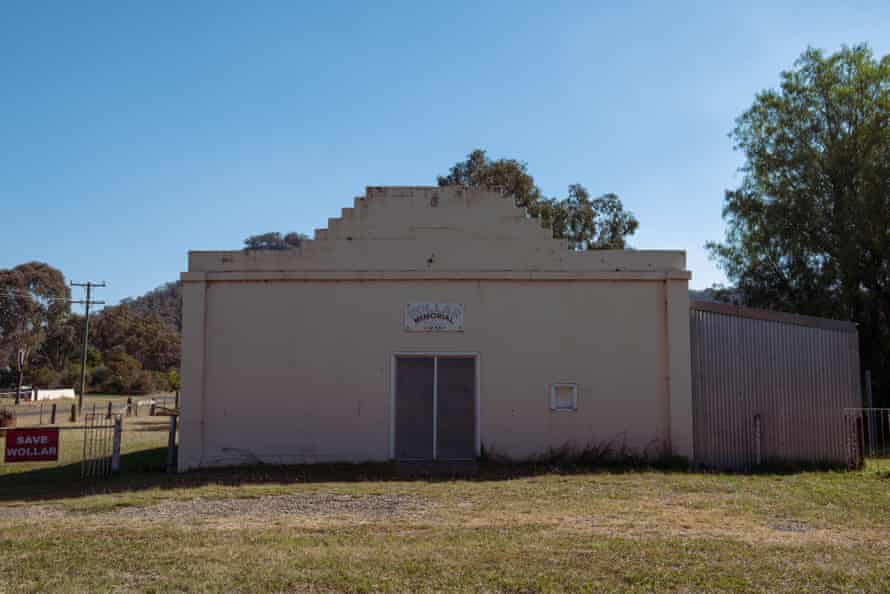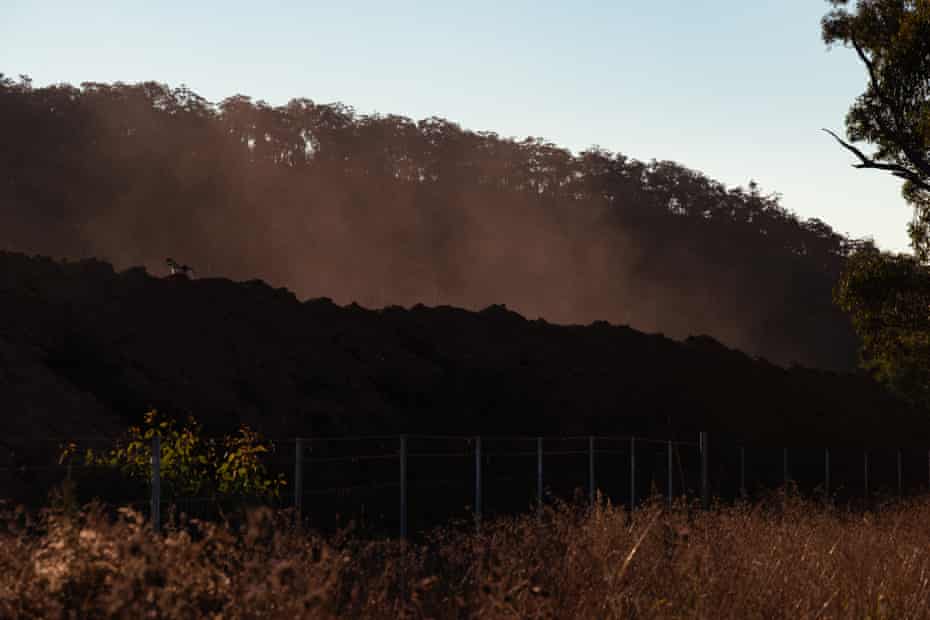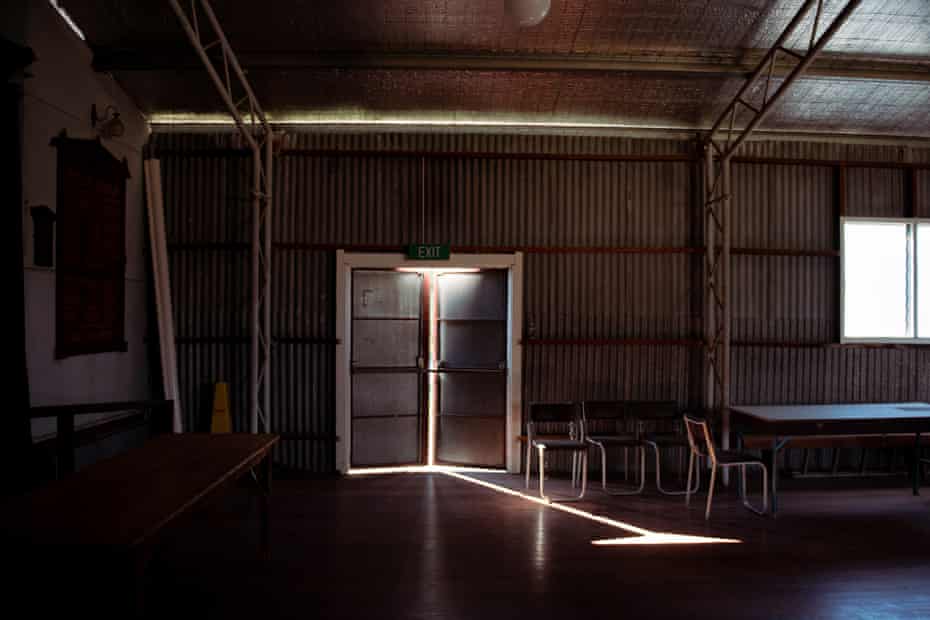Extract from The Guardian

Col Faulkner, 68, owns the only house in Wollar that hasn’t been bought up by US-based miner Peabody
Bev Smiles usually turns up at least an hour before the start of any functions at Wollar’s community hall – a spot for many a dance and committee meeting over the years.
“We have to get in early with leaf blowers to get an inch of dust off the floor – every surface in the hall is black,” Smiles says. “That’s what people’s kitchens are like.”
Over
the past 15 years, the rural community of Wollar in New South Wales’s
central west has been slowly eaten by a massive coalmine run by US-based
Peabody.
Peabody’s Wilpinjong mine has bought up the area – from land and homes to churches – and now all but one house in the town is owned by the miner.
That house is owned by 68-year-old Col Faulkner, who moved there 38 years ago after he “got the shits with Sydney”.
He feels comfortable in Wollar. He has his fruit trees (apricots, plums and peaches) and a creek at the bottom of the yard with a swimming hole. “Where will I find all that in another place?”
As he talks to the Guardian, noisy friarbirds call out loud. “They’re eating the pink blossom off the ironbark trees,” says Faulkner, who is still the trustee of the unused cricket ground, and treasurer of the community hall.
While families sold up and moved away, Faulkner rebuffed all approaches from Peabody. “I told them I’m not selling and I’m waiting for them to go away and we can repopulate the village.”
Last week, the NSW state government announced it was paying a Chinese mining company $100m to walk away from a coalmine application on the Liverpool Plains, 200km to the south of Wollar.
But at the same time, the government released another 80sq km of land for coal exploration over an area encircling Wollar.
Faulkner is holding out for a change of government – or a change in policy – that will see new coalmines blocked.

The government released an initial suitability assessment for the new Wollar coal area where there was 250m tonnes of the fossil fuel.
More mining would “further impact the small remaining Wollar community” but the government “considers that further population declines are likely irrespective of whether the potential release area is released for exploration and development”.
This enraged Smiles. “Their assessment of the impact on Wollar is to say that it’s already stuffed,” she says.
‘Likely to accelerate the decline’
According to financial statements, in 2020 the Wilpinjong mine generated $71m in cash for Peabody – a company that deals solely in coal at a time when economies are working out how to move beyond the polluting fossil fuel. The mine looks profitable, but is part of a financially troubled company laden with debt.
Peabody’s original 2006 approval allowed the company to mine 13m tonnes of coal a year for 21 years.
To get to the coal, the company uses explosives. Within a year, Peabody was applying for the first of seven “modifications” to its approvals, allowing it to increase the number of blasts from one a week averaged across a year, to five per week.

In 2017, the NSW government granted a major extension, allowing Peabody access to another 95Mt of coal on 800ha of land and extending the mine’s life out to 2033.
As it was applying for that extension, the company commissioned a social impact report that said services in the town were “already marginal” and the extension was “likely to accelerate the decline of Wollar village”.
Health services ‘no longer operate’
Peabody now owns 43 of the 61 properties in the broader Wollar area, including two churches, which no longer run services.
The dedicated local rural fire service has been merged and, the assessment said, health services “no longer operate”. The village’s public school closed in 2018.
Terry Rheinberger ran Wollar’s town store for 30 years and had a house and land about 5km out of town. He was the Wollar Rural Fire Service captain. But he sold up to Peabody about 10 years ago and now lives about 50km away near Mudgee.
How had the town changed while he was running the store?
“Not changed,” he says. “Destroyed is probably the right word. We had a community around us that was like a family. You can’t buy that.”
According to Rheinberger, store turnover dropped $300,000 the year after the mine started. Uncertainty over whether locals would be bought out “eats you alive”, he says.
“It makes people who are really good friends enemies. It plays with your mind. There are divorces. It is just wrong for people to be treated like that.”
But Rheinberger doesn’t only blame the mining company. He says it is the state government that opened up areas for coalmining (an activity which he also says he is not against).
Mick Fetch’s family were among the early late 19th-century settlers in Wollar. His childhood holidays were spent on his uncle’s property and he had a house in the village. Now he rarely visits.
“It got a bit much for us,” he says. “The mining company comes in and drives a wedge through the community. That’s what they did. I wanted my kids to have a taste of that life in Wollar I had, but people were just disappearing. That’s not to mention the noise and the dust.
“You would wake at 3am to the sound of the dozers and you could hear them – clickety-clack, clickety-clack.”
Locals have also complained of a smell of rotten eggs that one 2015 report from Peabody said has “at times resulted in perceptible odour and/or associated environmental complaints from nearby private receivers”.

Fetch remembers going to progress association in the early years of the mine to hear the company promise jobs for people in the area. He says they didn’t materialise.
In 2016, he tried to buy St Laurence O’Toole Catholic church as the family home. He used to go to mass there as a child. The diocese sold it to Peabody.
‘Responsible development’
Peabody’s Wilpinjong operation is one of three mines employing about 1,700 people in the western coalfields region that collectively hold approvals for 60mt of coal a year.
The NSW government’s assessment says opening the Wollar area could net the state $500m in royalties.
Because there was demand for coal in Australia and overseas, emissions from burning the coal would “occur regardless of whether the coal resource in the potential resource area is developed or not”.
Peabody has previously applied for an exploration licence over some of the area now released by the government. Asked if it was looking to tender for the new area, a spokeswoman said: “We continue to evaluate longer-term options.”
The spokeswoman said the company
acknowledged the mine had “affected the small village of Wollar and we
have at every stage of the exploration and mining process sought to
genuinely engage with local residents to minimise the impacts of our
mine”.
Peabody worked hard to minimise social impacts, and the government had supported its land purchases that also acted as dust and noise buffers. Dust and noise were monitored and the mine operated under “strict” controls including for dust and noise.
Properties bought by the mine were either leased to their original owners, other community members or mine workers, she said.
She said “on balance” the mine had delivered significant social benefits to Upper Hunter communities and towns which “must be considered when assessing the impacts on Wollar”.
Peabody’s plans would see the mine operate until 2030, she said. Coal had a record of “reliability, scalability, affordability and security of supply”. She said cutting emissions through more efficient power plants and capturing carbon “must be part of the solution” for lowering greenhouse gas emissions around the world.
The Guardian sent questions to the Department of Regional NSW, asking why the community had been allowed to decline and why Wollar’s demise had been used in part as justification for further coal exploration.
A statement said the government “remains committed to supporting responsible development of the state’s high-quality coal resources and providing a balanced approach to the future of coalmining in NSW”.

The Wollar area was under consideration for coal releases since the 1970s, the statement said, adding: “Coalmining generates essential jobs for communities and royalties that can be used for essential public services and infrastructure and our recovering regional economies will depend on coalmining as a key industry for some decades to come.”
‘Gut-wrenching’
Bev Smiles has been part of the Wollar community for about 35 years. Her home is 12km from the town but close enough to the mine for blasting to rattle her windows.
She has put her liberty on the line to block the mine. In April 2017 she and two others were arrested for blockading. A magistrate recorded no conviction.
“As much as people wanted to stand together and fight it, in the end for their family’s health they had to get out of there,” she says. “It has been the most gut-wrenching experience. It has destroyed people’s lives.
“We had a very very tight-knit community of people. It was a lovely place to live. That is what’s personally impacted me. Losing my friends.”
.png)
No comments:
Post a Comment